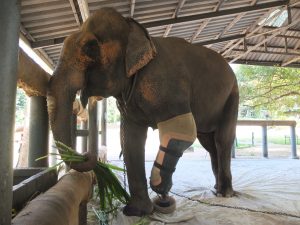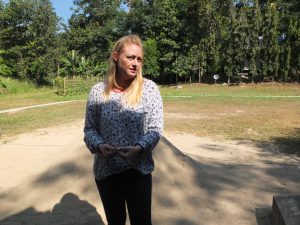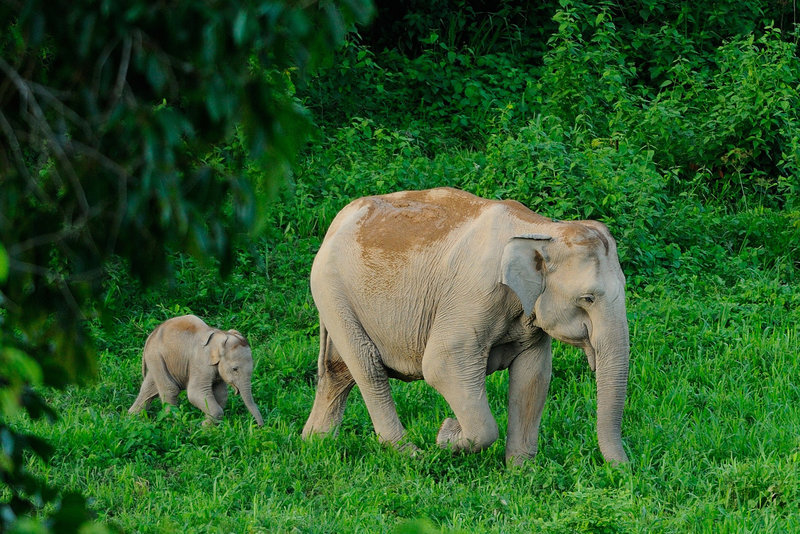Most people that vacationed in Thailand a decade ago were eager to ride an elephant and proudly show the photos to friends back at home. Now warnings about the cruel conditions many captive elements live in abound and elephant tourism is a whole other animal. Today, the same scenario will get you elephant-tourism shamed by friends and social media followers bombarding you with information about abuse.
Elephants, the adored national symbol of Thailand, remain a big draw for tourists. For decades, people have flocked to the country’s hundreds of elephant camps to see the lovable giants, pet them, feed them, wash them, ride them and watch them perform in shows.
Over the last several years, however, the often sad plight of captive Asian elephants has come to light, with Western media presenting news and ads warning people against visiting elephant camps, taking rides, or supporting elephant tourism.
Photos of mahouts [trained elephant handlers] with hooks, animals with their legs chained, and baby elephants being beaten flood the media. At the same time, more and more camps have sprung up in Thailand marketing themselves as “elephant retirement homes” or “elephant sanctuaries,” but skeptics aren’t convinced that anything has changed besides the names of these places.
All of this leaves tourists wondering, “Are these places okay to visit?” and “Is there any way to responsibly interact with elephants?” They want to see these amazing creatures, yet they are learning that — for the animals’ own welfare — perhaps they shouldn’t.
Here, elephant experts weigh in on whether or not there is any ethical elephant tourism in Thailand and how tourists should proceed.
Soraida Salwala is the founder of The Friends of the Asian Elephant Hospital (FAE), the first elephant hospital in Thailand and home to Mosha, an elephant that stepped on a landmine as a baby and became famous as the first pachyderm to wear a prosthetic leg.

Mosha. Photo: Laurel Tuohy/Coconuts
Soraida does not believe tourists should visit any venue that offers elephant rides or shows, though watching them in natural habitats — not performing in a show — is okay. She doesn’t support the riding of elephants since wearing harnesses on their backs for 10 or 12 hours daily isn’t good for them.
When it comes to other activities, she said, “If tourists want to come to Thailand and wash an elephant, they have to realize that the elephant had to stay in the water for long hours when, in real life, they wouldn’t bathe for that long, it can hurt their health,” she said, likening it to a person sitting in a bathtub for several hours.
Tourists need to realize that they are not performing a service for the animals they visit in these establishments, as many like to believe when they scrub an elephant’s back and legs, but are taking part in a tourist activity isn’t good for the elephants, Soraida said.
However, she doesn’t claim that tourists need to avoid elephants altogether.
“These elephants need our help. The elephant camps feed the elephants, the mahouts, and their families. I’d rather have people just sit and watch elephants walking around and having a shower on their own. They don’t need to touch the elephants, the elephants shouldn’t have to play games for them,” she said of the circus-like performances that are standard at many camps.

Soraida Salwala. Photo: Laurel Tuohy/Coconuts
She also commented on phajaan, the widely-publicized and much-maligned process of breaking an elephant’s spirit in order to make it submit to human instruction. The process involves physical and mental torture. Soraida said that not all captive elephants go through phajaan since those born in captivity are already accustomed to humans. She also noted that FAE has introduced a more humane set of standards for doing phajaan, when it is needed.
“This practice is going to lessen over time. I don’t want elephants in this industry at all, but the ones in captivity can’t go back to the wild. So we have to find a way not to exploit or abuse those that are currently captive.”
Matthew Pritchett, the Director of Behavioral Change and Communications for Freeland, an anti-trafficking foundation, also disagrees with the full-contact elephant tourism that has become popular. He recommends skipping excursions that offer rides and shows. He said, “Because elephants are sometimes poached from the wild for shows, we suggest that tourists avoid them. It is always better to play on the side of caution, and if there is any doubt, don’t visit the place.”
“Whether originally wild or domestic, elephants at these places can be treated inhumanely, often being beaten during training until they become compliant enough to take human riders, and there have been links between captive elephants and the illegal ivory trade.”
“As for elephant tourism that doesn’t include riding, animal sanctuaries which have become tourist attractions are often under scrutiny,” he said.
He noted that tourists traveling to Thailand are lucky since it’s one of the few places in the world that people can still see wild Asian elephants roaming freely. He mentioned Khao Yai and Keng Krachan National Parks as places tourists can go to have an elephant experience without contributing to possible animal rights violations.
Carmen Rademaker is the founder of Naka Elephant Foundation and has the most moderate views among the experts Coconuts spoke with. She even thinks that, under certain conditions, visiting camps and riding elephants can be okay.

Carmen Rademaker. Photo: Laurel Tuohy/Coconuts
“Because they are strong, putting a person on an elephant is not such a big deal. What’s a big deal is – how many hours they work? Do they get enough food? Do they get proper nutrition? Often you see baskets of fruit at these places, but that’s like giving them candy all day; it’s very bad for them. Also, are they in the shade or the sun? They need shade. The sun causes problems for them, such as eye infections. We focus on management and care more than the activities, like riding or a show.”
She pointed out that elephants in the wild will walk for as many as 18 hours a day, moving and eating and keeping busy. So, in her opinion, a show might not be that bad and may keep the elephants from becoming bored. She believes that much of what is portrayed in Western media is misinformation and that extreme activists have had alarmist reactions that do little to help the situation.
Rademaker mentioned the sensational TV ads in the West that show abusive scenes with messages about not riding elephants in Thailand.
“It’s crazy. People believe that it’s a horrible thing, that all Thai people abuse their elephants.”
To Rademaker, the sensationalism peddled by these ads reveals an even darker side of the elephant tourism industry.
“There’s a lot [of propaganda] about elephant abuse in Thailand. They all use the same video of a baby elephant being beaten and follow it with a sentence like ‘This is what happens to an elephant before you ride it. So stop riding.’ But that’s nonsense. They show the most extreme thing because it raises funds. As soon as you see a tortured baby elephant, it’s like ‘Ok, I’ll give you money.’ It’s marketing, but it’s not reality.”
This is one such video, though posting it here is not saying that we support or verify it as factual.
“A lot of places also claim that they have rescue elephants, but they are not even foundations. They are just elephant camps that have renamed themselves. It’s a huge marketing tool.”
However, instead of working against the camps, she’s trying to work with them.
She has set up a group of 40 international experts, led by researchers at Chiang Mai University, to research all camps in Thailand and set up standards to certify them.
She hopes that through standard-setting, some of the worst practices can be eliminated.
“The laws are out of date here. It will be a slow process to change that, but I feel very strongly about education and bringing more awareness to what’s really happening.”





